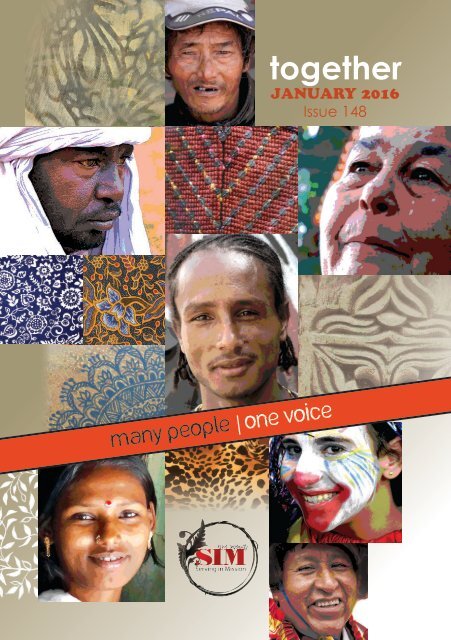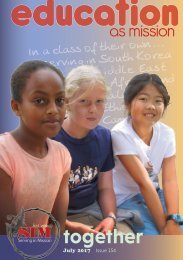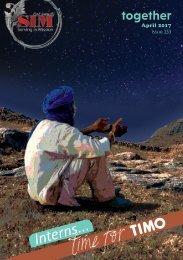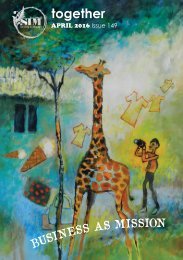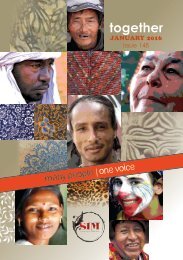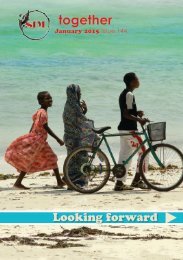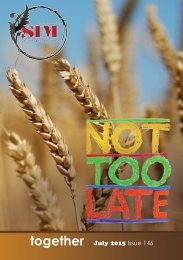together -Jan 2016
SIM NZ quarterly magazine #148
SIM NZ quarterly magazine #148
You also want an ePaper? Increase the reach of your titles
YUMPU automatically turns print PDFs into web optimized ePapers that Google loves.
<strong>together</strong><br />
JANUARY <strong>2016</strong><br />
Issue 148<br />
many people | one voice
Official publication<br />
of SIM New Zealand<br />
(Serving In Mission), an<br />
inter-denominational<br />
evangelical Protestant<br />
mission.<br />
Editor: Zoë Cromwell<br />
Print: Ideal Print<br />
For security reasons<br />
some contributors may<br />
use pseudonyms. Stock<br />
photos are sometimes<br />
used to help represent<br />
stories. Except for<br />
stock photographs,<br />
all images copyright<br />
©2015 SIM and its<br />
licensors. All rights<br />
reserved. SIM New<br />
Zealand (#CC28002) is<br />
a registered charitable<br />
entity in terms of the<br />
Charities Act 2005.<br />
For more information,<br />
visit the Charities<br />
Register at www.<br />
charities.govt.nz<br />
SIM New Zealand, PO<br />
Box 38-588, Howick,<br />
Auckland, 2145<br />
Phone: 09 538 0004;<br />
Freephone:<br />
0508 47 46 69;<br />
Email:<br />
nz.info@sim.org<br />
Office: 12B Picton<br />
Street, Howick, Auckland,<br />
2014<br />
By prayer...<br />
Is prayer your steering wheel or your spare tyre?*<br />
Is prayer a rope that you hold?l<br />
Prayer isn’t just for a few who have the time<br />
and the gifting to pray ... everyone needs to be<br />
involved. Prayer is one of the most important<br />
ingredients in recruiting and releasing people to<br />
serve God in mission, as this verse makes clear:<br />
“The harvest is great, but the workers are<br />
few. So pray to the Lord who is in charge of the<br />
harvest; ask him to send more workers into his<br />
fields.” (Luke 10:2)<br />
Join us in praying that the Lord would increase<br />
our mission partners from 42 to 60 by<br />
2017 by releasing 10 new long-term members<br />
and 20 new short-term associates each year.<br />
We have experienced through SIM’s history<br />
that God answers prayers as we have sent out<br />
workers across the world.<br />
* Corrie ten Boom<br />
lMission pioneer William Carey said in 1793:<br />
“I am willing to be lowered into the depths of the<br />
mine to dig, but remember, you must hold the<br />
ropes.”<br />
2
Editorial<br />
This was the text we considered during our devotional times at the recent<br />
Many People One Voice Consultation (see report on page 20). In writing<br />
Romans, Paul was seeking to unify the Roman church and ground them<br />
solidly so they could become a base for missionary work into new areas. In<br />
the same way, for us in SIM to move forward <strong>together</strong> in collaboration, to<br />
develop strategies to focus our mobilisation and communication into new<br />
areas where people are “living and dying without the Gospel,” we too need<br />
to be unified: not “same same” – that’s uniformity – rather “same same but<br />
different” – strengthened through diversity. Not everyone will be doing the<br />
same task. Not everyone will be the focus of the photograph of SIM, but we<br />
will all be in the photo, contributing with our voice to the glory of God.<br />
In Romans 15-16, Paul shares these very practical points:<br />
• as many people, we need to put others first, just like Jesus did (15:1-6)<br />
• as many people, we need to receive one another without any preconditions<br />
(15:7-13)<br />
• we all participate <strong>together</strong> in God’s mission – there are no second-class<br />
missionaries (15:14-29)<br />
• By Prayer: with one voice we pray <strong>together</strong> and for each other (15:14-33)<br />
• with one voice we praise <strong>together</strong> (16: 25-27):<br />
Now to him who is able to strengthen you according to my gospel and the<br />
preaching of Jesus Christ, according to the revelation of the mystery that was<br />
kept secret for long ages but has now been disclosed and through the prophetic<br />
writings has been made known to all nations, according to the command of<br />
the eternal God, to bring about the obedience of faith— to the only wise God<br />
be glory forevermore through Jesus Christ! Amen.<br />
In this magazine you will hear from some of our mission partners who are<br />
part of the many people singing praise with one voice.<br />
Nigel Webb<br />
3<br />
May the God who gives endurance and<br />
encouragement give you the same attitude<br />
of mind toward each other that Christ Jesus<br />
had, so that with one mind and one voice<br />
you may glorify the God and Father of our<br />
Lord Jesus Christ… It has always been my<br />
ambition to preach the gospel where Christ<br />
was not known…<br />
— Romans 15:5-6, 20 (NIV)
Sowing the good seed<br />
For those who go<br />
and plant in foreign<br />
soil, the outcome can<br />
be affected by many<br />
things — a willingness<br />
to learn as well as<br />
teach, the readiness of<br />
the community to<br />
engage, the preparation,<br />
the weather.<br />
What God uses especially<br />
is a heart to<br />
bless the lives of their<br />
neighbours at every<br />
level...<br />
Crops<br />
of hope<br />
“My children were not eating well. Thank you for showing<br />
us how to plant crops that enabled us all to eat better.<br />
I planted two years in a row before moving down here to<br />
the main road.”<br />
Dee Jones, Pastor Kapayi and I had travelled for nearly two hours over back<br />
roads near Kasempa, Zambia, searching for participants from a nutrition<br />
programme that Dee was part of in the community three years ago. We had<br />
stopped at one place, but the mum was out in the fields working hard. At<br />
another place the family had moved on. We asked at the rural clinic where<br />
the training had taken place, but they kept no records.<br />
Everywhere we asked we saw many children roaming around and a<br />
few men completely sloshed on fermented grain or honey – barely living;<br />
without hope. Having also given up hope, we stopped into a market on our<br />
way back to town and asked if there were any participants there. One of the<br />
mothers, Gladys, was there and very grateful for the help that “Sister Dee”<br />
4
had been to her family.<br />
Everyone gathered<br />
around to hear the conversation<br />
and asked for<br />
Dee to come back again.<br />
Dee is currently learning<br />
Kaonde, the local<br />
language, to be able to<br />
communicate effectively<br />
and better help communities<br />
like this to apply<br />
Foundations for Farming<br />
principles and thereby<br />
break the cycle of poverty<br />
and hopelessness.<br />
— Nigel Webb<br />
5<br />
Lessons from<br />
the harvest!<br />
• God opposes the proud but gives grace to<br />
the humble. After I read many articles on<br />
growing techniques in the desert and talked<br />
to Western ‘experts’, the locals all had much<br />
better crops than me. I have come to realise<br />
that the locals know how to grow a good<br />
field and survive here much better than I do.<br />
• Sow in good soil. There’s a reason they fight<br />
over the good dirt and don’t do what I did<br />
and try to improve the rocky ‘no-mans’ dirt.<br />
• When the rains fall everyone has a good<br />
field, but when they stop you see who planted<br />
wisely. My rocky field looked amazingly<br />
impressive while the rains fell! But when the<br />
rain stopped it died off within 10 days.<br />
• The height of your crop doesn’t matter; the<br />
amount of corn or grain that comes off it<br />
does!<br />
• And to humble me even more...my wife<br />
grew possibly the best peanut and bean crop<br />
in the whole region in our little back yard.<br />
Praise the Lord that at least I married smart!<br />
— Pete Johnstone, Sebba, Burkina Faso<br />
Harvesting corn with his neighbours: these<br />
relationships are growing well through Pete’s<br />
farming and are the key focus of the work.
Peru’s youth empowered<br />
I met Gaby when she was 13. She was a tiny, shy girl in our junior youth group<br />
who could barely say her name in public. But after years of discipling and<br />
training, Gaby is growing into a confident daughter of God, full of passion and<br />
a deep desire to serve him.<br />
The turning point for Gaby was a church mission trip. She only went because<br />
she wanted to see another city, but while there, she started listening to<br />
and obeying God’s voice. One day he told her to go and share the gospel with<br />
the women in the local market. Quechua women are not always very approachable,<br />
and Gaby, who was half their size, was very afraid. But she knew God<br />
wanted her to go, so she prayed, “Lord, give me the words to share with these<br />
ladies.” Gaby went to the market, and God gave her the words.<br />
Now 19, she is a youth leader at her church. “Before I knew God, I was<br />
so shy, and really struggled with what to do with my life,” she says. “Working<br />
with the youth group has taught me that I need to trust God with my future.”<br />
Gaby is now studying business administration and wants to use her career to<br />
serve the Lord. She has no problem speaking in front of people these days. She<br />
has learned to live by Philippians 4:13: “I can do all things through Christ who<br />
strengthens me.”<br />
Almost half Peru’s population is under 25. One of the biggest worries for<br />
youth is getting a university education. Although universities are available,<br />
many cannot afford to go or cannot pass the entrance exams. And those who<br />
6
do earn a degree are not guaranteed good jobs. Unemployed graduates are<br />
susceptible to ills such as depression, substance abuse or gangs. The evangelical<br />
church in Peru is in an ideal place to reach out to youth, but only a few of<br />
the many churches have a trained youth pastor. Existing youth programmes<br />
are usually run by lay leaders who lead miniature church services.<br />
Future leaders<br />
As churches recognise the need to train youth leaders, SIM is ready to<br />
come alongside. As mission partners, instead of leading one youth group, we<br />
want to train youth leaders and empower the Church to care for their young<br />
people. The first step is developing disciples of Christ like Gaby, who will later<br />
become leaders in the church, so I adapted the Jesus Focused Youth Ministry<br />
programme from Barry St. Clair’s Reach Out Ministries. This programme<br />
focuses on six areas: developing a deep relationship with Jesus Christ, praying<br />
with passion, developing leaders, discipling students, encouraging outreach<br />
activities in churches and<br />
encouraging outreach activities<br />
outside churches.<br />
Through the programme<br />
more than 700 youth<br />
leaders from 40 churches<br />
have been trained throughout<br />
Peru. Four of these<br />
have become Eagle Leaders,<br />
working with me to<br />
provide leadership training<br />
workshops for the local<br />
churches. One of them<br />
says “Youth ministry is all about one-on-one discipleship,<br />
helping youth discover who they are in Christ and<br />
then building a lasting relationship that will guide them<br />
through life’s struggles.” Mike develops youth ministries<br />
in some of the poorer parts of Lima, Peru’s capital.<br />
Other leaders include Pedro, a new pastor who is<br />
helping the Presbyterian Church develop youth work;<br />
Daniel, a pastor and director of a Bible institute, helps<br />
pastors in his city better meet the needs of youth; and<br />
Diego, an educator who works directly with young people,<br />
helping them discover their identity in Christ.<br />
– Cynthia Sundman<br />
Pray<br />
For the many<br />
youth leaders<br />
whom God has<br />
changed and is<br />
using to help<br />
meet the needs<br />
of Peru’s young<br />
people.<br />
7
Kiwis in Botswana<br />
Heat, dust and grace<br />
“It’s 48 degrees and no water for days,<br />
a massive dust storm right now, and<br />
it gets even worse when there is no<br />
power and you have to stand over the<br />
kids for hours waving books and wet<br />
cloths! ...And yes, we are all ok!”<br />
Daniel and Anita Muir and their children have<br />
been in Gaborone, Botswana since March 2015.<br />
They are there under the ministry of Flying Mission<br />
where Daniel is involved in the IT department<br />
helping Flying Mission Services (flying ministries)<br />
and Flying Mission Care (care ministries).<br />
Anita looks after their two young daughters and is<br />
building relationships with women and children in her local community;<br />
she runs a weekly kids’ outreach programme at their house as well as a Bible<br />
study with the street ladies.<br />
Botswana has had a strong history of mission and church work but the reality<br />
of what this means in people’s personal understanding, commitment and<br />
lifestyle is often quite removed from this history. While many people may call<br />
themselves Christian the fact is this is often a label they cling to without much<br />
understanding of what that means. This has led to many people being misled<br />
by cults, prosperity teaching and local traditional religion. Botswana needs<br />
people to help in supporting the church in leadership, youth and children’s<br />
work, care ministries and mobilisation of the church to reach out to people<br />
in their communities and people who have not yet heard the name of Jesus<br />
Christ.<br />
The Muirs have a desire to see the church in Botswana develop spiritual<br />
maturity and to live out and teach people around them about what being a<br />
follower of Jesus Christ means. You only have a to spend a few days with them<br />
(as I got to do recently) and their energy and passion for engaging with people<br />
is evident; from going with Daniel as he took me around the various ministry<br />
sites of Flying Mission and watching him so naturally engage with everyone we<br />
met, to walking with Anita and her children around their local community and<br />
seeing the way Anita was known and recognised by many of her neighbours.<br />
8
A family calling<br />
Serving overseas and engaging with people<br />
to build relationships so that they will<br />
come to an understanding and experience<br />
of God’s love and grace is<br />
part of Daniel and Anita’s DNA.<br />
They are both children of SIM mission<br />
partners and grew up seeing their<br />
parents building relationships and<br />
engaging in the world around them so<br />
that it became ‘normal’ for them.<br />
Daniel’s parents are Ted and Andrea<br />
Muir, who were missionaries with SIM<br />
in Peru doing camping ministry for 4<br />
years, and Anita’s parents are Jim and<br />
Helen Harrington who were missionaries<br />
with SIM in rural Burkina Faso<br />
for 12 years.<br />
Many of them stopped to<br />
say hello and talk and play<br />
with her children.<br />
Being with the Muirs<br />
reminded me of what I love<br />
about hanging out with mission<br />
partners. Serving overseas leads<br />
people to work in IT or health,<br />
teaching, sports, youth, theology<br />
and many other areas as a way to<br />
build up and support the church<br />
and to bring the gospel to people<br />
who have never heard.<br />
9<br />
continues over the page u<br />
Pray<br />
• For the relationships they<br />
are building in Gaborone.<br />
• For grace and strength for<br />
what every day brings.<br />
• For utilities such as water<br />
and power not to fail<br />
when the Muirs need<br />
them.
But underlying all of this is the desire and ability of mission partners to<br />
make connections with people they come across so they can be a Christian<br />
witness or a Christian example. And for Daniel and Anita these people are local<br />
staff working as aircraft mechanics, students studying at the only aircraft mechanics<br />
course in Botswana, local children who come to their house each week<br />
for a children’s programme, mothers who live down the road, the woman who<br />
they buy ice blocks from and so many more.<br />
— Sean Marston<br />
Don’t get us wrong...<br />
“The truth is, continual water and power shortages aren’t the things we<br />
find the hardest,” the Muirs wrote recently. “In photos you see Anita and<br />
the children with huge smiles at kids’ outreach on Wednesdays. What you<br />
don’t see is the mess that is left to be cleaned afterwards, the preparation<br />
that goes into it beforehand, the day when a kid goes home for good because<br />
everyone is laughing at his holey shoes. The parent who comes and<br />
adds their own personal beliefs on to the end of your devotion.<br />
“Don’t get us wrong!— kids’ outreach is going amazingly, we are so<br />
encouraged by this door God has opened. We are just saying that it’s not all<br />
pretty butterflies and hokey pokey ice cream.<br />
“You see photos of Daniel... Days can be filled with extremely productive<br />
IT work which ensures all ministries run smoothly and everyone is extremely<br />
grateful and happy. But there are also days where we wait in long<br />
lines to buy new parts, only to be sent to the shop next door. There are<br />
days where the whole Flying Mission Office and/or Hangar is put on hold<br />
because there is no internet and hours are spent climbing up and down<br />
roofs or in dark tiny holes where cables are hiding.<br />
“Don’t get us wrong! — Daniel is loving his role more than ever and we<br />
know God has us in exactly the right place, but it’s just not always a box of<br />
delicious Cadbury chocolates!”<br />
10
alongside shalom<br />
In some<br />
countries SIM<br />
works strategically<br />
by providing funds and<br />
other support to likeminded<br />
local organisations.<br />
The doctor who heads Shalom,<br />
one of SIM’s partner ministries<br />
in an Asian city of 22 million<br />
people, says that their ministry<br />
is now the only one in that city<br />
working with HIV/AIDS clients.<br />
She talks about broken lives and<br />
the stigmatization that still<br />
exists. “Those infected get turned<br />
away at the government hospitals and if they<br />
finally agree to admit them, they get treated like<br />
cattle,” she explains.<br />
Shalom’s clinic is in a bleak and dry neighbourhood<br />
far from the leafy, affluent suburbs of the<br />
city. This ministry has the vision to bring holistic<br />
transformation and hope to the lives of the urban<br />
poor, with a special focus on people infected with<br />
and affected by HIV/AIDS. Through care and<br />
support to individuals and families, including palliative care, they are the hands<br />
and heart of Christ to desperate and broken<br />
people who have nowhere else to go.<br />
Paul in Philippians writes, “I always pray with<br />
joy because of your partnership in the gospel…”<br />
Our local partners are committed brothers and<br />
sisters who have huge hearts and a calling to work<br />
with the poor and broken. We praise God for how<br />
he is at work through them, and for the privilege<br />
of working alongside them. Individuals, families<br />
and whole communities are being touched by<br />
God’s transforming love.<br />
— a Kiwi mission partner in Asia<br />
11<br />
Give<br />
This ministry urgently<br />
needs funding.<br />
To support staff salaries<br />
and other clinic/community<br />
needs, email nz.donor@<br />
sim.org. and quote Project<br />
#98551
Sharing God’s<br />
story.<br />
Mobilising<br />
people to go.<br />
Zebras, giraffes and wildebeest roamed free at the roadside as some 80<br />
SIM workers arrived from Nairobi airport to Lukenya Getaway, Kenya, for<br />
the Many People One Voice Consultation (12-17 October 2015). Many of<br />
these people were communications and mobilisation specialists or strategic<br />
leaders. During the week we built on SIM’s recently rewritten Purpose and<br />
Mission Statement and our Vision Statement, looking at strategic questions,<br />
new technologies and practical ideas for collaborating across SIM. And we<br />
worshipped God in song, in prayer and in his Word, including a great evening<br />
with a multi-ethnic/ multi-lingual worship team from the Good Shepherd<br />
Church, Nairobi.<br />
The first three days involved<br />
plenary sessions and table discussions<br />
about why the ‘WHY’ question is so<br />
critical to our mobilisation and communications<br />
efforts, setting out a fresh<br />
focus on mobilising prayer, people and<br />
resources for ministry rather than just<br />
recruiting people for jobs, and finding<br />
funds for projects. We explored<br />
focused mobilisation and communication<br />
for priority ministries, with an<br />
emphasis on teams and tough places.<br />
“...setting out a fresh<br />
focus on mobilising<br />
prayer, people and<br />
resources for ministry<br />
rather than just<br />
recruiting people for<br />
jobs...”<br />
12
As SIM International Director, Dr<br />
Joshua Bogunjoko said, “we are not<br />
trying to list all our ministries in our<br />
mission statement, we are trying to<br />
clarify our calling.”<br />
The next two and a half days communications<br />
and mobilisation matters<br />
were explored separately, including<br />
topics like videography training, discussions<br />
on story vs. security on the<br />
communicator side, and internships<br />
and church mobilisation on the mobiliser<br />
side.<br />
As we gathered <strong>together</strong> again on the afternoon of the last day, we<br />
heard from many people but went away with a sense of one common voice.<br />
We agreed on ways to really inculcate our new mission and vision statements,<br />
on plans for 125th year celebrations in 2018, on new structures to<br />
collaborate more to write great stories of what God is doing and regular teleconferences<br />
to develop mobilisation to and from new areas. Starting new<br />
teams for new initiatives will be a priority, including looking for key team<br />
leaders from amongst our experienced mission partners.<br />
“teams are a priority”<br />
This was great talk, now comes the work. Isaiah 52:7 says, “How beautiful<br />
on the mountains are the feet of those who bring good news, who<br />
proclaim peace, who bring good tidings, who proclaim salvation, who say<br />
to Zion, ‘Your God reigns!’” As we put feet on these recommendations, we<br />
are glad to have met in person those beautiful people with whom we work<br />
in an emerging global work culture, permeated by the sense of belonging to<br />
a great, shared story and the collaboration of many people with one voice.<br />
NB. No giraffes were hurt in the writing of this story, but one was followed<br />
on a quad-bike. J<br />
— Nigel Webb<br />
13
Embracing life as a<br />
rubber band<br />
“...I’m not sure<br />
you called the right<br />
person here.”<br />
Several months ago I farewelled the sun and the sand of Sydney to move to<br />
Ulaanbaatar, the capital city of Mongolia. For an Aussie who has lived most<br />
of his life with sand and surf, this really is “the ends of the earth”. For me<br />
living in Mongolia is to be stretched in many directions. My tongue is twisting<br />
and my ears are itching with the strange sounds. In the first few months,<br />
the many cultural obligations seemed interesting. But as the reality set in,<br />
the differences became more acute.<br />
“Live life as a rubber band” has become my unofficial motto as the Lord<br />
and I have been sharing this journey <strong>together</strong>. We’ve had some interesting<br />
conversations, and a few arguments. He always wins, but he’s gracious<br />
enough to listen to my side before he helps me to see that his way is best<br />
— though not always easy. He’s been challenging me to embrace being<br />
stretched, to give up some of the perceived rights I have held on to and<br />
partner with him in the process. There are three main rights I’ve been seeking<br />
to lay down.<br />
1) Time. Mongolians’ nomadic heritage has shaped how they deal with<br />
the world around them. Life is transient and time is tremendously flexible.<br />
People leave planning or taking action to the last minute. Whereas I like to<br />
have an idea where I’m going and what I’ll be doing. Mongolians don’t plan<br />
too far ahead, because you never know what a day may hold. The national<br />
!<br />
14
psyche is geared towards the<br />
need to contend with the<br />
changing environment that<br />
was instilled when life was<br />
bound to a ger. I am learning<br />
that time is flexible, but Christ<br />
is immutable.<br />
2) The right to understand<br />
everything that is going<br />
on around me. The differences<br />
in culture and language are<br />
Ulaanbaatar<br />
confusing; I spend most of<br />
my time in a vortex of confusion. I attend a Mongolian church, and listen to<br />
Mongolian sermons, but understand very little. Shop signs and advertising<br />
confuse me. But Christ is abundant.<br />
3) The right to be heard and understood when I speak. Often I cannot<br />
get across the point I want to make because I am using the wrong Mongol<br />
words or grammatical structure. Or maybe my English words and accent<br />
make it difficult for my hearers to understand. This can be disheartening,<br />
but the Lord has challenged me to let go of my “right.” It’s difficult, but I’m<br />
learning to stop and remember that he created language. If I ask for his<br />
help, he’s more than able to provide wisdom and the right words.<br />
Sometimes it feels like I am being stretched so far that I’m going to snap!<br />
I tell the Lord, “I’m not<br />
sure you called the<br />
right person here.” He<br />
replies simply: “I AM.”<br />
—The writer, who prefers<br />
not to be named, is<br />
with SIM Mongolia and<br />
seconded to JCS International.<br />
He teaches<br />
English. In his spare<br />
time he partners in a<br />
sports-based<br />
outreach.<br />
15<br />
...when life was bound to a ger.
Tell us your idea!<br />
We have hundreds of places around the world crying out for workers, with length<br />
of service lasting from a few weeks to a lifetime. Whether you are able to serve<br />
in a business, in agriculture, in a school, university or seminary, in a care facility<br />
or hospital or somewhere else, we probably have a role for your unique gifts and<br />
passions.<br />
But if you don’t see what you’re looking for in our current list, tell us<br />
your idea. We want the message of God’s kingdom to be heard and seen and we<br />
would love to discuss helping you with your mission venture.<br />
Start a dialogue with us by going to www.sim.org.nz<br />
and clicking on GO, or phoning us on 0508 47 46 69 for a<br />
chat, or emailing us at nz.info@sim.org<br />
For a quick list, scan your smartphone here<br />
Re-baptism, Ethiopian Orthodox style<br />
...or check out these life-changing<br />
opportunities:<br />
Teachers<br />
Grace International School, Thailand, Sahel Academy,<br />
Niger, and Bingham Academy, Ethiopia, all have ongoing<br />
needs for staff, elementary & secondary, from<br />
Sciences to English to IT to Art and Sport. In a few<br />
weeks they will be posting their specific needs for<br />
teachers starting in August <strong>2016</strong>. Get an idea at the<br />
websites below, and contact us. We know these<br />
schools because they have Kiwi staff and/or<br />
students.<br />
• http://www.gisthailand.org<br />
• http://sahelacademy.com<br />
• http://binghamacademy.net<br />
Bingham field trip with Jo Wallace<br />
16
Joanne Borlase<br />
“I’m going to the Philippines as a Mission<br />
Mobiliser – educating Filipino churches in<br />
mission and equipping them to do their role<br />
as senders.<br />
“For the past five years I have been<br />
working with a mission organisation in New<br />
Zealand endeavouring to help NZ churches<br />
engage more deeply in mission, and have<br />
provided training for short-term mission<br />
Paula Macfarlane<br />
“Although originally from Ireland, I’ve<br />
lived in Southland for 21 years. I attend<br />
Invercargill Central Baptist Church. I’m<br />
a GP and I’m hoping to work at Tansen<br />
Hospital in Nepal for a year. Medical work<br />
overseas has been my intention ever since<br />
I decided to study medicine, but as a solo<br />
parent I’ve had to wait until my children<br />
left home before I could start to realise<br />
that ambition.”<br />
leaders and trained teams going on short term<br />
mission trips. Although I’ve lived in Tauranga for the last five years I call Nelson<br />
home; my home church is Hope Community Church. From 1993-2001 I lived in<br />
the Philippines and was involved in evangelism and discipleship.<br />
Doctors<br />
Would you like to make a difference in<br />
some of the poorest regions in India?<br />
Our partner is serving impoverished<br />
rural communities through medical,<br />
community health, and community<br />
development ministries. Please prayerfully<br />
consider how you could be involved.<br />
This is a priority, strategic need.<br />
Two+ years.<br />
Contact us and quote # 8408<br />
17<br />
Media & IT people<br />
Are you experienced in web design?<br />
The media team in Ethiopia wants to<br />
reach urban youth with new broadcasts<br />
they have developed; your<br />
primary job responsibility would be<br />
to design an attractive web page to<br />
support streaming, downloading and<br />
feedback. Short term position, training<br />
a local person to maintain the website.<br />
Contact us and quote # 8738
Learn<br />
The Bhojpuri of North India<br />
Pray<br />
Love<br />
The home area of the<br />
Bhojpuri-speaking people<br />
extends from the Himalaya<br />
foothills to the Ganges plains.<br />
In history the warriors of<br />
Ujjani Rajput came from their<br />
villages. Mahatma Gandhi<br />
launched his passive resistance<br />
campaign in their midst.<br />
Most of the estimated<br />
50.6 million Bhojpuris live in<br />
houses made of mud and sticks<br />
with thatched roofs and dirt<br />
floors. Many now live in the<br />
mega-cities of India. Most are<br />
vegetarians, growing rice, wheat and sugar cane. They are also involved in<br />
cottage industries, such as weaving. They enjoy storytelling, dance, folk<br />
songs and films.<br />
These people believe that they will cleanse themselves from sin by<br />
bathing in the sacred Ganges River. Many Bhojpuri come to the ancient<br />
city of Varanasi, considered to be Hinduism’s holy city, to die, because they<br />
believe the direct gateway to heaven lies through the most ancient part of<br />
the city.<br />
Because they have been viciously conquered several times by outsiders,<br />
who often forced their religion on them, they are strongly resistant to the<br />
gospel. SIM and partners work among them, including some Kiwis. Five<br />
years ago there were no churches among these people. Today in Eastern<br />
Uttar Pradesh alone there are close to 5,000 house churches — nevertheless,<br />
there are still thousands of Bhojpuri villages with no church. The New<br />
Testament has been translated into Bhojpuri, with work in progress to complete<br />
the entire Bible. The Jesus film and Christian broadcasts and audio<br />
recordings are available in their language.<br />
The Bhojpuri are a warm-hearted people, whose lives revolve around<br />
their families. It is through natural networks developed in families that the<br />
gospel finds the most acceptance. Friendship evangelism and relationshipbuilding<br />
are effective strategies that reach the heart of their culture. People<br />
from the lower castes have been most responsive to the gospel.<br />
PRAY: for more workers willing to befriend Bhojpuri-speaking people,<br />
build strong relationships and tell them about the God who loves them.<br />
18
[project]<br />
@ Sahel Academy<br />
In one of the poorest<br />
countries in the world,<br />
running a 21st century MK<br />
education and supporting it<br />
with the necessary technology<br />
is a daily miracle. Power<br />
outages, heat and dust,<br />
fluctuating internet mean the<br />
school’s computers have to<br />
be up-to-date to cope.<br />
Well, they’re not.<br />
Funds for MKs’ education<br />
Sahel Academy in Niger still<br />
needs more than $30,000 to provide new<br />
laptops and the technology to support<br />
them. Gifts for this project will help<br />
provide the equipment replacement<br />
and upgrades necessary for the<br />
curriculum. Even when a teacher is<br />
not available children will have<br />
better access to online courses.<br />
The school has 200 students from<br />
20 countries whose parents serve<br />
in surrounding areas.<br />
We have Nicola Burrows<br />
working at the school as a dorm<br />
assistant and youth worker.<br />
Go to www.sim.org.nz and click<br />
on DONATE, quoting project<br />
# NE88750


